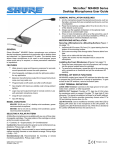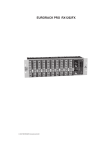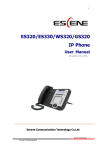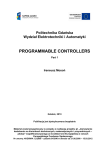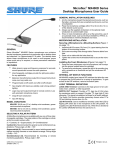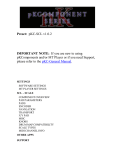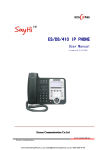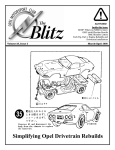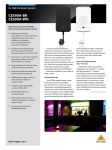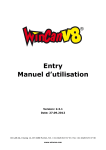Download click away - Consorzio Milano Ricerche
Transcript
EC. DG INFSO. IST Programme project grant n. FP7-214306 FP7 JJuuddiicciiaall M Maannaaggeem meenntt B Byy D Diiggiittaall L Liibbrraarriieess SSeem maannttiiccss D.6.4 Demonstration to Polish Pilot Document type: Deliverable Document number: D.6.4 Delivery status: Delivery date: Version: Authors: DOCUMENT QUALITY CONTROL Version 1 2 3 4 5 6 7 8 9 10 Date 11/03/2011 16/03/2011 Delivery Version 1.0 Version 2.0 AUTHORS ESA CoW ESA Maciej Kotok Krzysztf Kamiński Rafał Dunal Partner ESA ESA TABLE OF CONTENTS 1 Introduction ........................................................................................................................ 4 1.1 Deliverable objectives............................................................................................................. 4 1.2 Audience of the deliverable................................................................................................... 4 1.3 Structure of the deliverable .................................................................................................. 4 2 Demonstration set up ........................................................................................................ 5 2.1 Localization of the Polish prototype ................................................................................... 5 Localization of the JUMAS portal ..................................................................................................... 5 Localization of the JUMAS components ........................................................................................ 5 Localization of the Jumas Process Configurator (JPC) ............................................................ 6 Filling up the Italian Jumas Portal ................................................................................................... 6 2.2 The physical layout ................................................................................................................. 7 JUMAS-SIDIP integration and security constraints .................................................................. 8 Scalability hypothesis ........................................................................................................................... 9 Setting up the courtroom infrastructure for audio-video acquisition .......................... 11 2.3 Collection of audio-video material ....................................................................................11 3 Demonstration tools ....................................................................................................... 12 3.1 JUMAS portal: user manual for law professionals.......................................................12 Login ......................................................................................................................................................... 12 Trial Archive.......................................................................................................................................... 13 Trial Details ........................................................................................................................................... 13 Hearing movie ...................................................................................................................................... 15 Document download.......................................................................................................................... 18 Search Trials.......................................................................................................................................... 18 3.2 JUMAS Process Manager: user manual for system administrators ........................19 4 Polish Pilot Demonstration ........................................................................................... 25 4.1 Meeting with PMJ in Wroclaw ..........................................................................................26 4.2 Conference in Krakow .........................................................................................................26 4.3 Seminary in Wroclaw ...........................................................................................................26 1 Introduction 1.1 Deliverable objectives This document describes all the demonstration activities performed during the JUMAS project focused on the Polish Pilot site. 1.2 Audience of the deliverable This deliverable is aimed at both an external and internal audience of interested users. In particular, this deliverable is targeted to all jumas consortium members and to potential end users. 1.3 Structure of the deliverable First of all, this deliverable describes the demonstration setup that was used for Polish pilot, which involves the physical configuration and collection of audio video materials. At next section the demonstration tool is presented with the detailed description of Jumas Process Configurator and Jumas Portal. Last section is dedicated to Polish pilot demonstrations which been done during the project to the Polish audience. 2 Demonstration set up 2.1 Localization of the Polish prototype Localization of the JUMAS portal Jumas System consist of two main components Jumas Portal and Jumas Process Manager (JPM). Originally Jumas Portal was available only in English, but the final prototype was adjust to Polish pilot and all text were translated according to Polish requirements. Therefore, the portal’s local resources (resx files) and database dictionary table has been configured for the Polish language. From the end user point of view, in order to enable the Polish language, an image representing the national flag on the portal’s master page has been provided. (see Fig. 1) Fig. 1. Jumas Portal – Polish prototype By clicking the Polish flag image-link the corresponding user-id culture (UICulture) updates the Poral Language Configuration Table presented in Figure 2. Fig. 2. Jumas portal language configuration table All demonstrations of Polish prototype were concerned Polish trials. given in Polish language and Localization of the JUMAS components Some of the analysis modules developed for the Jumas system needed to be tuned for Polish pilot. This were basically modules that operates on text and sounds, in particular ontology, information extraction, emotion recognition, automatic speech transcription and deception detection. Localization of the Jumas Process Configurator (JPC) The Jumas Process Configurator, is a standalone application that manages the execution of processes, ranging from the upload of the multimedia material on the JUMAS portal to the invocation of multimedia analysis functionalities as speech recognition, video annotation, etc… This component, designed for system administrators, has been customized for the Polish Pilot. Most important parameters are presented in the table below. Parameter Value C:\media_lib\ Multimedia processing library path \\192.168.100.150\media_lib\ Remote multimedia streaming library path C:\media_lib_streaming_tmp\ Temporary streaming path 192.168.100.150; JUMAS_JPM; jumas; SIDIP Data base connection https://jumasportal.esaprojekt.pl/ Jumas Portal address Table 1. Jumas Process Manager configuration for Polish pilot Filling up the Italian Jumas Portal Several multimedia contents have been acquired at the Court of Wrocław and. All these contents, described in section 2.3, have been uploaded on the Polish Jumas Portal in order to demonstrate the potentiality of the developed system. The acquired audio/video material has been uploaded on the Jumas Portal by using the SIDIP and the localized Jumas Process Configurator described above. Once the record for a given trial has been created by using the SIDIP functionalities, the corresponding folder was available into the Jumas Process Configurator. This allowed us to upload the media files and invoke the functionalities for populating the Portal with multimedia and semantic information. The media sessions, media channels and media files for the acquired material at the Tribunal of Wrocław have been managed with the JPC for making available the multimedia and semantic contents on the JUMAS portal for the demonstration phase. This management included the creation of media sessions, the definition of media channels and the upload of media files. Fig. 3. Management of media contents for filling up the Jumas Portal 2.2 The physical layout Jumas is a distributed system, wich works on different platforms and operating systems. It is also integrated with existing Court Management System, which is Sidip in this case. The whole physical architecture is presented on the figure below. Fig. 4. Jumas hardware configuration The Jumas end user has access to the system through Jumas Portal which is deployed on VM-Jumas-Portal virtual machine. He also has access to Sidip system (deployed on the same VM) where trials and hearings can be managed. All multimedia stored in Jumas system are kept in Media Library on the Jumas Process Manager machine. The processes are run also on this VM. Jumas Ubuntu is a linux server where web services are deployed. The following configuration has been adopted in order to deliver the JUMAS demonstrator for the Polish Pilot. VM Jumas Portal Description Virtual Machine Name: VM-Jumas-Portal Operating System: Microsoft Windows Server 2008 Firewall: windows firewall Services provided and corresponding ports: • Application Server (Jboss): 80 • Internet Information Services (IIS): 80 • Internet Information Services (IIS): 443 • Remote Desktop (RD): 3389 • Oracle DB Expected network traffic: between 50 MB/Day and 20 GB/Day according to the courtroom activity Virtual Machine Jumas Process Manager Name: VM-Jumas-XP Operating System: Microsoft Windows XP Professional Firewall: windows firewall Services provided and corresponding ports: Expected network traffic: between 50 MB/Day and 20 GB/Day according to the courtroom size and activity Virtual Machine Jumas Ubuntu Name: VM-Jumas-Ubuntu Operating System: Ubuntu Firewall: Services provided and corresponding ports: • Application Server (Jboss): 1547 • File Transfer Service (FTP): 5521 • Secure Shell (SSH): 5522 • Remote software control (VNC): 6346 Expected network traffic: between 50 MB/Day and 20 GB/Day according to the courtroom activity Table 2. Virtual Machines Description JUMAS-SIDIP integration and security constraints The Jumas system has been designed in order to cooperate with any Court Management System (CMS). In particular integration with SIDIP system was implemented. The Jumas system shares the physical database with it: same schema and same instance. The integration with SIDIP has been done at the database level: the entities of the Jumas database which concern CMS data have been substituted with database views on SIDIP schema. In this way, changes performed in SIDIP are immediately available to JUMAS. The authentication for the JUMAS portal is performed by using the User Interface available on the Jumas Portal instead of using the LDAP application protocol provided by SIDIP. A pluggable component behind the User Interface abstracts the authentication from LDAP. Note that all authorization information are stored in the database. The JUMAS-SIDIP integration is depicted in Fig. 5. Fig. 5. JUMAS-SIDIP SIDIP integration Scalability hypothesis Hypotheses of court infrastructure for future JUMAS installation can be defined according to the Court dimension. Considering that, in a single courtroom is 6 hours hours of hearings per day and all hearings need to be recorded with a single video channel (640x480 640x480 resolution and 24 fps) and 4 audio channels (16 kHZ, 192 kbps and 32 bit) it is about 16 GB per day per courtroom. A scalability hypothesis is described as follows: - Small Courts.. A law court of small dimension (1-5 (1 5 courtrooms) requires a total amount of space of 3,2 - 16 TB, per year. - Vertical scalability: o Data Base: 2-3 3 CPU at 3,2 GHz, RAM 4 to 32 GB o Audio Server: 2 CPU at 3,2 GHz, RAM 4 to 8 GB o Video Server: 2 CPU at 3,2 GHz, RAM 2 to 8 GB Fig. 6.. Infrastructure hypothesis for small courts - Medium Courts.. Considering a medium law court of about 10 courtrooms. The total requested data amount is 32 TB per year. - Vertical scalability: o Data Base: 3 to 4 CPU at 3,2 GHz, RAM 8 to 32 GB o AS: 2 to 8 nodes, 1 to 2 CPU at 3.2 GHz, RAM 4 to 8 GB o VS: 2 to 8 nodes, 1 to 2 CPU at 3.2 GHz, RAM 2.5 to 8 GB Fig. 7. Infrastructure hypothesis for medium courts - Large Courts.. Consider a large/metropolitan law court dimension with about 30 courtrooms. The total requested data amount is 100 TB per year. - Vertical scalability: o DB cluster: 4 to 10 nodes, 3 to 4 CPU at 3,2 GHz, RAM 8 to 32 GB o AS-Infra Infra cluster: 4 to 10 nodes, 2 to 4 CPU at 3,2 GHz, RAM 8 to 12 GB o AS-MT: MT: 4 to 10 nodes, 2 to 4 CPU at 3,2 GHz, RAM 3 to 12 GB o VS: 4 to 10 nodes, 2 to 4 CPU at 3,2 GHz, RAM 3 to 12 GB Fig. 8.. Infrastructure hypothesis for large courts Setting up the courtroom infrastructure for audio-video audio video acquisition Table below presents the equipment used for trial recording done in Jumas Projet. Name Type Manufacturer Touch screen TPMC TPMC-8T Crestron Driver CP2E Crestron RS-232/422 Module STI STI-COM Crestron DVD/HDD Recorder SR--DVM700 JVS DVD Player DVD DVD-S511 Panasonic Microphone MX418D/C Shure Microphone MX418/C Shure Microphone MX418E/C Shure Audio mixer PRO RX1202FX Behringer Rack Microtech Camera EVI EVI-D7OP SONY Plasma screen TH--42PS10 Panasonic Videoterminal PCS PCS-G70 SONY Table 3. courtroom infrastructure for audio-video audio acquisition Number 1 1 2 1 1 4 1 3 1 1 2 2 1 2.3 Collection of audio-video audio material During the project several recording sessions was done. 1. Court of Wroclaw – 12.03.2010 4 real trials was recorded. recorded. Duration of trials lasted from 20 minutes to 2 hours. 2. Court of Wroclaw – 15.06.2010 1 demo o trial was recorded. recorded. This trial lasted about one hour. 3. Court of Krakow – 23.06.2010 1 demo trial was recorded. It was a demo trial presented to the audience of all presidents of polish District Coutrs. It lasted 30 minutes. In the last part of project Court of Wroclaw has also make available about 10 recordings done in Verbateam project. All of this hearings lasted less than one hour. All recordings were uploaded and processed by jumas system and are available through the jumas Portal. 3 Demonstration tools 3.1 JUMAS portal: user manual for law professionals Jumas Portal is a web application that allows user to search and browse trials and documents related to them, and to watch audio and video content with text annotations related to the recordings. Jumas portal provides the metaerials as AV stream. The latest versions of Polish pilot of Jumas Portal is available at the following address https://jumasportal.esaprojekt.pl/ Polish pilot This version is related to Polish trials however it is available in three language versions: Polish, English and Italian. Login The first thing user should do to get access to Jumas Portal is to log in. There is a preset user account that has access to limited number of trials made for presentation purpose. To log in please provide following data: Login: Password: Fig. 9. Login page Polish pilot ********* ********* Trial Archive After the user is logged in the trial archive is presented. User can browse only trials that he is authorised to. User is able to filter list of the trials by name or description. Fig. 10. Trial archive To get the detailed information about particular trial user should click on the chosen item on presented list. Trial Details The Trial Details page presents most important information related to the selected trial. The page is divided into two tabs. The first one presents information retrieved form CMS system. The second one is related to one of Jumas system modules – Multimedia Summarization. Details This tab shows trial main data such as court name, section, the trial matter, some short description, and list of people involved in this trial. Fig. 11. Trial details At the bottom of this tab a trial folder is presented. It contains a list of hearings and a list of documents related to the selected trial. Storyboard The storyboard presents the two lists of movies. The first one – “Summarization” – is a result of the Multimedia Summarization module. The second one – “User annotated” – is a list of user annotations with corresponding part of a movie. On the top of storyboard there is Online Summarization section. In this section user can enter a query and generate multimedia summarization in a real time for this query. To watch any of listed movie parts user has to click it. The movie will start from the moment in time when the related annotation was assigned. Fig. 12. Storyboard Hearing movie Browsing hearings on the “Trial details” page user can choose a hearing movie. Audio-video streaming page will be displayed. Fig. 13. Hearing movie Movie User can play, pause and scroll through the presented movie. To control the audio-video material a typical user interface is used. While movie is being played the the results of emotional state and gestures recognitions are presented on the screen. Fig. 14. Play movie control Annotations At the bottom of page a list of annotations is presented. The annotations are divided into three groups. First one, “Transcription”, is a result of Automatic Speech Recognition module. The second one is “Automatic annotations” which presents all annotations made by analytical modules. The third group presents annotations manually added by user. Clicking on each annotation moves a movie to the related time period. Fig. 15. Annotations When a deception is detected then transcription is highlighted in different colour. User Generated Annotations On the right site of the page a user annotation control is presented. It allows user to add his own annotations to the presented movie. Fig. 16. User annotations control A user can set annotation start and end time using Set Current buttons. User annotation can be also imported from a text file. Document download While browsing trial folders on the trial details page user can choose a document to download. A download document page will be displayed with some basic document information. Fig. 17. Document download To get this document user should click on download button. Search Trials Search trials page enables user to easily find trials and documents he is looking for. User should provide a search phrase and optionally choose some narrow search options. Fig. 18. Search trias Fig. 11. Search trials – Narrow search 3.2 JUMAS Process Manager: user manual for system administrators Main Window Main window is divided on to three panels: • SISIP trials – SIDIP trials’ structure • Media Sessions – Media sessions for selected hearings • Uploading – list of currently uploading media files JPC configuration Under Main menu\Jumas\Options you can find option window with 3 tabs: JPM configuration, Database connection, Jumas portal. JPM configuration tab On the JPM configuration tab you can set destination directory for uploaded media files (Path for multimedia library folder). If Use path for IIS streaming option is checked then video files prepared for IIS streaming are uploaded to directory specified in Path for IIS streaming, otherwise are uploaded to directory specified in Path for multimedia library folder. If Use temporary directory option is checked then results of video encoding for IIS streaming are stored in a directory specified in Path for temporary directory for streaming. When encoding is completed they are moved to destination directory. Database connection tab In the Database connection tab you can specify database connection string parameters. Jumas Portal tab Jumas Portal tab – here you can change video streaming quality. Process configuration Under Main menu\Process configuration there are two options: Jumas Processes and Work groups od Jumas processes. Jumas Processes In this option user can configure a list of processes (ASR, Emotion Recognition etc.) responsible for analyzing media files and generating annotations. To add new process user have to specify at last: • Module name – name of the process • Module tag – short name of the process • Multimedia format – input file format for the module. Filed Work directory and Params pattern are unused. Work groups Use this option to configure which Jumas Process works on which computer. Work group means a computer/os system where the Process is installed. To add Work group you have to specify at last: • • Work group name Multimedia directory root path – directory in which the process can find media files to be processed • Max amount of running processes – maximum number of processes which can be simultaneously executed in the work group. To add Process for a work group you have to specify at last: • Method process execution – choose one of: exe-file, http-post • Link/Path – address of the web service if http-post method were specified or path to the executable file (exe-file method). • Max amount of running processes in group Media Sessions To associate media files with the given trial new Media session has to be created. For the Media session you should define media channels. We can distinguish three main types of channels: • SINGLE_AUDIO – create this channel to upload audio file for a trial. • AUDIO_VIDEO – create this channel to upload video (audio-video) file • STREAMING – create this channel to prepare streaming for Jumas Portal One media channel can contain only one file in specific format or multiple files each in different format. To create streaming for Jumas Portal Streaming file for IIS option needs to be selected. Taks Under Main menu\Tasks you can find two options: Task Patterns and Tasks. Task Patterns In a Task pattern option we can configure a list of Jumas Processes that will be executed for media sessions. Task pattern can be used to create Task for a particular media session (see next chapter). To add new Jumas Process to the task pattern you have to specify: • • • Jumas Process Position - determines the order of execution of the process in the task. If two processes have the same position it is mean that can be executed simultaneously Multimedia type – refers to the channel type required by the Process Tasks To run Jumas Process for the given Media session following steps have be performed: 1. Create an empty task - Task button in the Media session panel (JPC - main window) 2. Define Jumas Processes to be executed – there are two ways to do it: a. Choose previously created task pattern b. Add processes manually - the same way as when creating task pattern 3. Accept task – select created task in List of tasks window and press Accept button. New productionTokens will be generated and processes will be queued for execution. 4. Check if JumasProcessExecutor service (windows service) is running 4 Demonstration activities 4.1 Polish Pilot Demonstration The final year of JUMAS project was when Polish Parliament changed the legislations of trial procedure in civil courts. It has a critical influence to the interest of Polish Ministry of Justice (PMJ), lawyers, prosecutors and private companies offering software and hardware solutions to the judicial sector. For that reason from the very first days of first prototype its Polish demonstration phase started. The system was installed on servers located in ESAPROJEKT promises and provided (https://JUMASportal.esaprojekt.pl/) to the potential end users with proper access privileges. System was fed with audio-video recordings performed in court of Wroclaw and demo trials recorded in Krakow. In the end of year 2010 there was a PMJ internal project – Verbateam that was run also in Wroclaw. During that project a nice set of recordings was performed, all of them were uploaded to JUMAS portal in audio and audio-video format. For each of Verbateam recording not only automatic speech recognition was done, but also manual transcription in cooperation with portal http://przepisywanie.pl/ <http://przepisywanie.pl/>. Accept the continuous demonstration of the portal on the web and group of individual meetings of consortium representatives with the end users, there were organized a couple of official events with judicial sector. 4.1.1 Meeting with PMJ in Wroclaw The meeting was organized on 1st and 15t of June 2010 in Court of Wroclaw (CoW). The meeting was organized by President of CoW with participation of Vice Minister of PMJ, Director of Polish courts in PMJ and Chief of IT department of PMJ. JUMAS project was presented to the audience. After the presentation, a long discussion about JUMAS project and portal took a place. Not only the research and development aspects of the projects were mentioned, but also a possible commercial usage of the system was discuss as well. During this demonstration, a teleconference with people form company MCX was organized. MCX company equipped in the past some of Polish courts with teleconference equipment. Possibility of usage of the hardware as the source of audio-video signal was discussed. The recordings performed with this equipment are available on JUMAS portal. 4.1.2 Conference in Krakow The meeting was organized on 11th of June 2010 in Krakow during a PMJ conference dedicated to electronic protocol and changes in Polish regulations. All presidents of Polish courts were invited to the conference and the Minister of PMJ was also a participant of the conference. The total number of the participants was more than 100. One of the main events of the conference it was a demo trial organized by people from CoW, ESAPROJEKT and NextiraOne (this company provided audiovideo hardware for the presentation). The recordings from this demo trial are available on JUMAS portal. The presentation was very welcomed by the audience and very good opinions about JUMAS portal were spoken. SIDIP was also presented on the conference as an example of the court management system used in Italy. 4.1.3 Seminary in Wroclaw The meeting was organized during a seminary “Praktyczne problemy transkrypcji e-protokołu” (Eng. “Practical problems of e-protocol transcription”) on 11th of December 2010 In Wroclaw. The total number of participant was about 30. Representatives of PMJ, including vice minister, judges and IT personnel of court of Wroclaw took part of in the seminary. There were also representatives of private companies interested in Polish judicial sector (i.e. NextiraOne, Unikkon, przepisywanie.pl). JUMAS portal was presented to the participants during the open session and it was one of the topics of dissociation during formal and informal meetings of the seminary. ESAPROJEKT and CoW collected all the feedback of the participants. Some of the suggestions were immediately implemented into the system. 4.2 Jumas Questionnaire SECTION 1: Questions about the overall jumas system 1) Information quality for retrieval and consultation purposes: High 1.1 1.2 1.3 1.4 1.5 1.6 1.7 Automatic Transcription Video annotation Emotion Annotation Deception Detection Multimedia Summarization Template Filling Items User Generated annotations 1 1 2 21 Medium 2 2 2 1 2 2 Low 19 19 19 19 18 17 2) The JUMAS System is useful for… 2.1 Training people 2.2 Sharing information 2.3 Reducing the time/costs between the recording and the availability of the transcriptions 2.4 Reducing the time for the retrieval process 2.5 Enhancing the consultation process 2.6 Supporting your decision process 2.7 Managing the "backoffice" of the proceedings (process manager) 2.8 Accessing information everywhere 2.9 Completeness of information available High 21 21 17 Medium Low 4 21 17 21 0 3 1 15 5 1 21 16 5 0 3) What will be the impact on your daily job if you will use JUMAS ? High H-17 Medium Low M-4 4) What is your global satisfaction? High H-17 Medium Low M-4 If moderately or unsatisfied, what didn’t meet your need or expectation? Automated transcription- 6 5) Which semantic annotations and functionalities do you think are really useful for your job? High 21 5.1 Automatic Transcription 5.2 Video annotation 5.3 Emotion Annotation 5.4 Deception Detection 5.5 Multimedia Summarization 5.6 Template Filling 5.7 Information Retrieval 5.8 User Generated annotations 5.9 Process Manager 5.10 Web Portal Medium Low 15 6 6 14 3 18 21 6 15 15 7 21 21 21 6) Which functionalities would you like to improve? High 6.1 6.2 6.3 6.4 6.5 6.6 6.7 6.8 6.9 6.10 Automatic Transcription Video annotation Emotion Annotation Deception Detection Multimedia Summarization Template Filling Information Retrieval User Generated annotations Process Manager Web Portal Medium Low 21 21 21 21 21 21 21 21 21 21 7) Do you think that JUMAS could be useful for the investigative/pre-trial phase? Yes No Y- 19 N-2 8) Web Portal Usability Strongly Agree I think I would like to use this web site frequently I found the Jumas Portal unnecessarily complex I thought the web site was easy to use I think I would need Tech Support to be able to use the Jumas Portal I found the various functions well integrated I thought there was too much inconsistency in the Jumas Portal I would imagine that most people would learn to use the Jumas Portal very quickly I found the website very I cumbersome to use I felt very confident using the web site I need to learn a lot about the Jumas Portal before I could 17 17 18 19 Strongly Disagree 2 1 1 1 5 2 1 1 1 2 2 2 17 2 15 17 7 14 2 19 3 1 1 16 4 1 effectively use it. 9) Overall Reaction to the Jumas Portal 0 1 2 3 4 5 6 7 8 9 NA Terrible Difficult Wonderful Easy Frustrating Satisfying 17 Stimulating 15 Flexible 14 7 9 Dull Rigid 17 10) Web Pages 0 Reading characters on the page Organization of information Hard Sequence of pages Confusing 1 2 3 4 5 6 2 8 2 Easy16 1 Confusing 2 Very clear 14 Very clear 11 5 1 1 5 6 NA 1 6 11) Terminology and website information 0 Use of terms throughout website Terminology is intuitive Position of messages on screen Website informs about its progress Error messages 1 2 3 4 7 8 9 NA 2 5 14 Consiste nt 1 1 4 14 Always 4 2 Inconsistent Never Inconsistent 1 1 13 7 1 1 Consiste nt Never 7 Unhelpful 5 2 Always 1 Helpful 18 12) Learning 0 Learning to use the portal Inconsisten t Performing tasks is straightforward Help messages on the screen Never 1 2 3 4 5 Inconsisten t 6 7 8 2 2 17 2 2 15 2 2 6 7 8 9 NA Consiste nt 17 Always Consiste nt 1 13) Website capabilities 0 1 2 3 4 5 9 NA Speed Too slow Reliability Unreliable Designed for all levels of users Never 1 12 3 1 3 1 Fast enough 19 2 Reliable Always 14) Overall Reaction to the Jumas Portal Strongly Agree I’m satisfied with how easy is to use the Jumas Portal It was simple to use I can effectively complete my work using this website I’m able to complete my work quickly I’m able to effectively complete my work I feel comfortable using the Jumas Portal Whenever I make a mistake using the portal, I recover easily and quickly It’s easy to find the information I need The information provided by the website is easy to understand The information is effective in helping me to complete my tasks The organization of information on the web pages is clear The web interface is pleasant The portal has all the functionalities and capabilities I expect it to have Overall, I’m satisfied with this web site Strongly Disagree 17 4 17 4 16 5 15 4 2 15 4 2 15 4 2 15 3 6 3 3 15 4 2 15 4 2 15 4 2 8 15 12 4 17 4 12 1 2 15) Keywords to describe the Jumas Portal Convenient 17 Familiar Slow Friendly 11 Straightforward Personal Confusing Stressful Fun Boring Innovative 19 Helpful Simplistic Empowering Usable 19 Old Complex 14 Irrelevant Dated Advanced Meaningful Clear 14 Flexible Sophisticated Effective Difficult Accessible Time saving 14 Too technical Intuitive 16 Organized Calm Disruptive Fast Consistent 10 Controllable Annoying Easy to use Comfortable Approachable Collaborative Distracting Frustrating Attractive Efficient 9 High quality Valuable Fragile Sterile Exciting Secure Predictable Intimidating Appealing Clean Comprehensive Unconventional Effortless Understandable 16 Low Maintenance Customizable Time consuming Stable Unattractive Stimulating Not valuable Relevant Inconsistent Professional 16 Compatible Incompressible Useful 17 Not secure Trustworthy Integrated Disconnected Motivating Poor quality Impressive Hard to use Essential Creative 15 Fresh Satisfying 17 Exceptional SECTION 2: Questions about functionalities 16) Emotion Annotation: Strongly Agree The set of considered emotions is significant The extracted annotations describe correctly the mood of the subject The emotion annotations are easily usable/available I can make use of information about the emotional state Strongly Disagree 17 4 17 4 17 4 17 17 17) Multimedia Summarization: Strongly Agree The extracted key-frames and the corresponding clips represent relevant parts of the hearing The extracted key-frames are overestimated The thumbnail view is satisfactory 2 Strongly Disagree 15 15 4 2 2 13 7 2 1 18) Video Annotations: Strongly Agree The video annotations correspond to interesting/meaningful parts of the trial The video annotations provide useful information about the participants in the trial The video annotations facilitate browsing the videos Strongly Disagree 13 6 2 13 6 1 1 14 5 1 1 19) Automatic Speech Transcription: o How much the immediate (at least the day after) availability of the transcription of a judicial trial is important for your daily job? Very important 18 Important 3 don’t care Not important Not important at o Is a 100% accuracy of the automatic transcription necessary for your daily job or could you tolerate some transcription errors (i.e. substitution of words, insertion of words, deletion of words) without affecting the meaning of what was uttered during the trial? 100% accuracy is: Necessary 16 Not necessary 5 o Suppose a 100% automatic transcription accuracy is possible. Do you prefer to have at disposal the exact transcription (i.e. including spontaneous phenomena, all discourses and comments by the various actors of the trial, etc) or a “not verbatim” proceeding? Exact transcription 21 “Not verbatim” proceeding o Suppose a 100% automatic transcription accuracy is not possible, could you give a list of “important” errors that should not be done by the automatic system? (e.g. Names of person, dates, names of localities, etc..) Dates 13 , places 13, names 11 o Suppose a 100% automatic transcription is possible only for some of the actors of a trial (judge, prosecutor, witness, lawyer). Could you order the list of actors according to the importance of their related automatic transcription? ___ Lawyer ___ Witness ___ Judge ___ Prosecutor All 21 respodents indicated witness as the first on the list. The second appears a judge. Other actors were placed aqually 20) Information Retrieval: Irrelevant The search results are typically 1 Of little use Relevant 19 1 Very useful The advanced search features are 1 I haven’t tried them 16 3 2 21) Deception Detection: Strongly Agree Strongly Disagree The extracted annotations correctly describe deceptive statements The extracted annotations correctly describe vague utterances The extracted annotations correctly describe negations I can make use of information about the deceptive indications 4 12 5 1 14 6 6 11 4 1 4 16 22) User Generated Contents (EML) Strongly Agree Adding tags to documents helped me to find and retrieve them later On The suggested tags are appropriate annotations for the Strongly Disagree 19 2 17 3 1 presented video Adding tags and comments is a useful means of communication about a case with colleagues. I can make use of information about the deceptive indications 13 4 4 13 4 4 23) Ontological Query Expansion Strongly Agree The expanded query is able to augment the initial query The query expansion functionality needs to be customized according to my preferences I would like to provide a feedback/refinement after a search result obtained with the query expansion functionality I must rewrite my query after a search result obtained with the query expansion functionality 17 2 Strongly Disagree 17 2 2 2 6 11 15 2 2 2 4.3 Potential exploitation Due to the change of Polish Code of Civil Procedure all hearings in Commercial Courts should be recorded and made available for judges, lawyers and other people involved to the trial. It makes a great opportunity for jumas system because it meets most of the requirements. Esaprojekt have attended several meetings with other companies to made one common solution that can be deployed as a commercial solution.





































